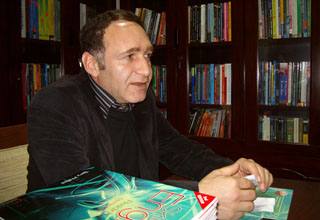
Behrooz Shojai, Kurdish philologist
“The unification of the Kurdish language could lead to the separation of our people”
- Behrooz Shojai was born in Kurdistan under Iran. In Sweden, a university lecturer in linguistics has received Luz in Dohuk (Iraqi Kurdistan). Shojai returns to Kurdistan because they need it to normalize the Kurdish language.

"Irakeko Kurdistango belaunaldi berriek apenas duten kontakturik
arabiar hiztunekin".
What is Kurdish? Where did it come from?
Like Spanish, English and most European languages, our language is Indo-European. It belongs to the Kurdish branch of the Indo-Iranian branch, which has close relatives to the Farsi, the Baluch and the Pashtun. It is said that our ancestors were Medes. Unfortunately, it is difficult to prove, because we barely have the inscriptions on the language of the Medes. Today Kurdish is the language of 40 million people.
It is divided into four countries in Kurdistan. Does this division appear in the language?
Yes, the borders of Iran, Iraq, Syria and Turkey today divide our country. It is difficult to classify the Kurdish language by the traditional method. Sometimes it is difficult to say whether we are talking about a set of dialects or a single language. Then the eternal question comes to mind: Where is the boundary between language and dialect? That’s why I prefer to stick to sociolinguistics and talk about “variants”. The Kurdish language has five: the dimili or zazaki in the north; the kurmanji, which is spoken in the north of Kurdistan in Turkey, Syria and Iraq; the Sorani language or the central variant; the Kurdish language influenced by the Farsi; and finally the Gorani language, dispersed between Iran and Iraq. Each of these five variants includes subvariants.
On the map you provide you can see a scattered community in the east of Iran, away from Kurdistan. What is their variant?
The Kurds of the Khorasan region moved eastward in the 15th and 16th centuries to fight the Mongols. As they were highly skilled soldiers, they were used to defend the eastern borders of the Persian Empire. They have remained there to this day, but they speak the Kurmanji of their ancestors.
Is there a united Kurdish?
We have a standard for Kurmanji and Sorani. The first is written in the Latin alphabet and the second in the Arabic alphabet. We cannot have a single standard, because it requires a variant with a reputation for this. Basing oneself on one language or another would mean underestimating the other. In the case of Kurmanji, the Botan region was adopted as the standard in the 1920s and 1930s, where most of the Kurdish literature originated. Most of the efforts to unify the Kurdish language are usually carried out outside Kurdistan, as it has been very difficult to encourage such initiatives in our territory. Note that the first Kurdish newspaper was published in Cairo in 1898.
So, two standards and each with its own alphabet...
It's hard, yeah. Many say that this situation can become a big problem, but whether we like it or not, we have a pluricentric Kurdish language. The process of nation-building started very late in our country. The periphery is usually strong, while the center is weak. This is the opposite of French. Paris has always been the center. Despite the numerous variations of the French language, the language of the capital quickly prevailed. In our country, neither the Kurmanji nor the Sorani would accept the imposition of the other, and the differences are not simple. Often there is no mutual understanding between the two variants. Thus, the unification of the Kurdish language could lead to the separation of our people. The clearest indicator is the history of repression that we share rather than language.
Okay, but wouldn't it be better to use a single alphabet?
The alphabet is not an obstacle to development. Any alphabet can be adapted to the phonological system of the Kurdish language, if desired, we could also use the Chinese. The Kurmanji make up the majority, so it would be difficult for twenty million people to learn the Arabic alphabet. It is easier for the Kurds of Iraq and Iran to learn the Latin alphabet because they know English.
What are the short-term challenges of the Kurdish language?
Like it or not, all languages must have a process of unification in order to survive. We need a good standard of Kurmanji and Sorani. Unfortunately, we cannot yet speak of good standards, especially in the case of the Sorani language. The Government of Iraqi Kurdistan does not accept the existence of two standards, they only maintain their own. But instead of isolating them from each other, these variants should work together.
Is that what you're talking about?
Instead of using different neologisms, from the Turkish on the one hand, and from the Arabic and/or French on the other, new words could easily be agreed together. In any case, the acceptance between Kurmanji and Sorani is essential to be able to look to the future. The rights of each speaker of the two variants to maintain and develop their own must be guaranteed.
Arabic has been replaced as a second language by English in Iraqi Kurdistan. Isn't that a contradiction in the people who live in the middle of the Middle East?
Arabic is still taught, but it is true that English has gained more weight. Today, the new generations of Iraqi Kurdistan barely have contact with Arabic speakers. The language of the southern neighbours comes only from television. In part, education based on Kurdish and English, languages of the same family, seeks to establish a connection with the West. Like it or not, Arabic is a Semitic language. It is a very different language and has often become an obstacle to the development of our language. For example, science books translated into Arabic are other than Lithuanian. n n n n n n n n